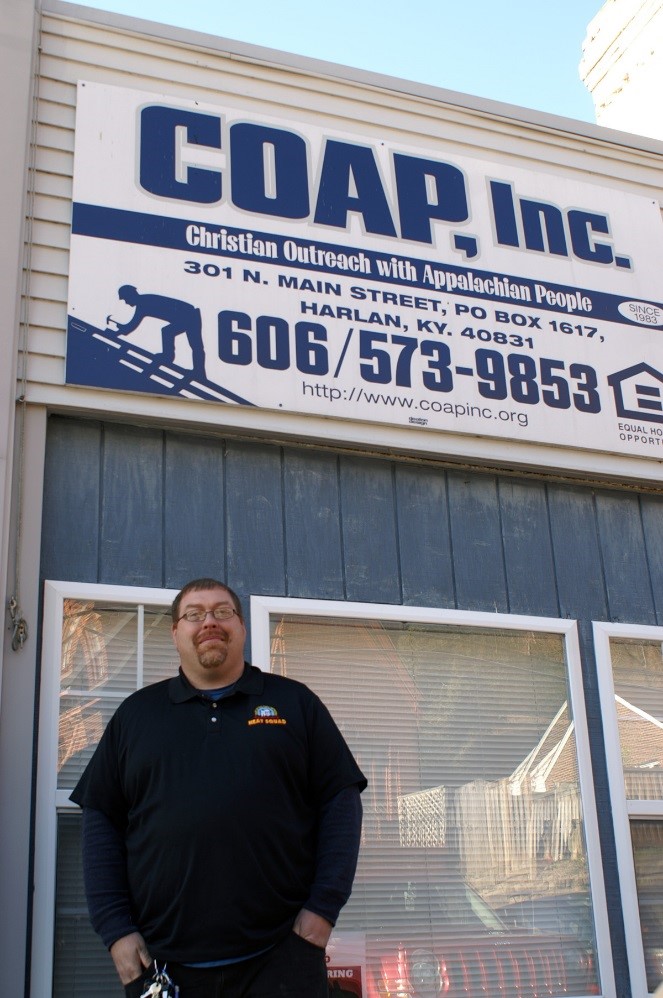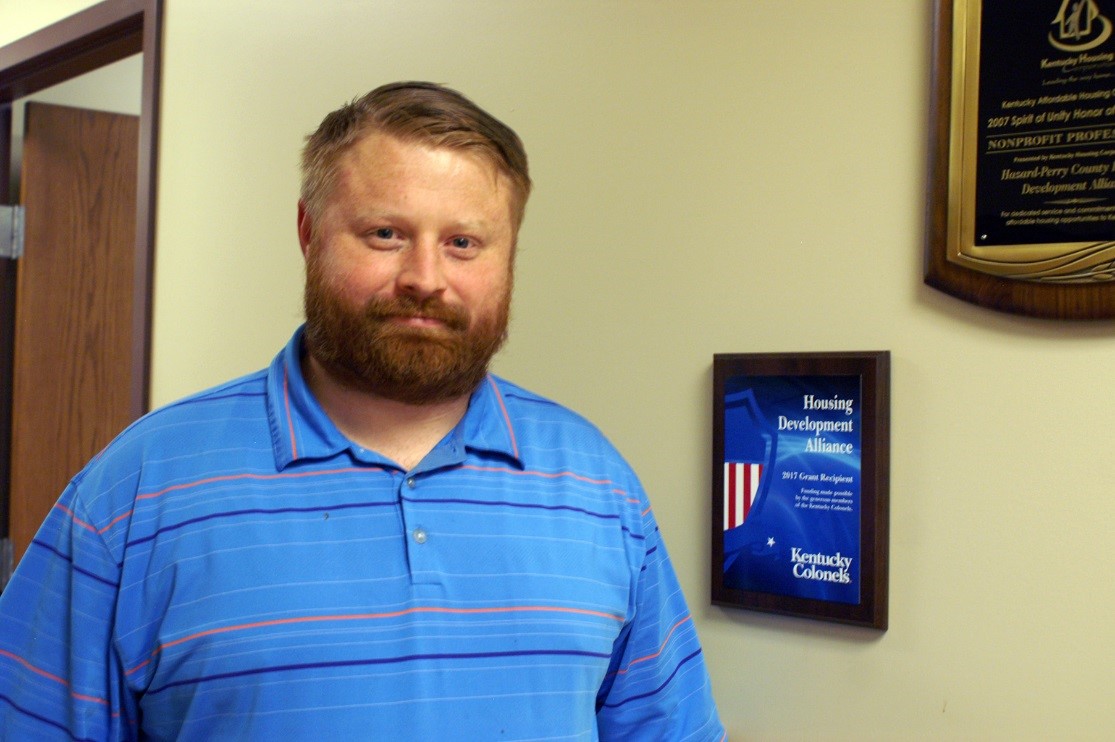Randall Howard just completed a new roof, switched an old large front window for a new one, and handed the homeowner the keys to her new door that actually locks.
Displaced Coal Workers Find Careers through New Energy Internships
Randall Howard just completed a new roof, switched an old large front window for a new one, and handed the homeowner the keys to her new door that actually locks. Howard is currently participating in the New Energy Internship program that he started in October 2017 and was placed at COAP, Inc., in Harlan, Kentucky. COAP’s mission is to provide sustainable, affordable, safe, energy efficient and dry housing to moderate-, low- and very low-income residents in Harlan, Bell and Leslie Counties.(1)
Energy efficiency has gained immense recognition in recent years as an excellent way to provide sustainably affordable housing for families. It becomes even more important for families of modest incomes. As the industry has grown, people have realized that many benefits such as comfort, health, and safety relate directly to home energy efficiency. As the coal industry in eastern Kentucky has become less prominent and jobs have dwindled, energy efficiency offers new opportunities for employment across the region.
Howard spends most of his time operating a program called Heat Squad,(2) performing energy audits for homeowners, retrofitting old homes, and building new ones. During his internship, he became a certified Building Analyst (BA) through the Building Performance Institute (BPI), a certified Home Energy Rating System (HERS) rater through the Residential Energy Services Network (RESNET®) program, and found an additional certification through the National Homes Training Center and Network, which allows him to inspect home health. Heat Squad has also partnered with University of Kentucky extension services to provide home health audits for asthma sufferers or people with asthma-related symptoms to 200 homes in Whitesburg and Harlan. Not only has Howard completed the required training and certification for the internship, but he has taken the initiative to provide healthy homes audits. He rose to the call of his community to provide a much-needed service.
"You’ve made my home so much warmer, and have made me feel so much safer."
— A COAP client humbly thanked Randall Howard for his work on her home.
Harlan is not a new place to Howard. He grew up in the surrounding Appalachian Mountains and currently resides in Leatherwood, which is close to Harlan. When asked about his passion for his work, he tells a story about growing up in eastern Kentucky with a single mother and a sister. Household chores and projects were often his responsibility, and he quickly realized there was a lot to know about taking care of a home. He developed his passion for caring for homes of the people he loved, which led him into the construction business where he worked for several years. Like many people in the area, he eventually ran into an opportunity he could not pass up in coal mining. He spent nine years working at a surface mine until he was laid off.

Randall Howard
Unfortunately, this story is all too familiar in eastern Kentucky, where the once prosperous coal mining industry is now in collapse. Coal jobs in the region have suffered a steady, but stark drop since 2008. There were 14,412 coal jobs then; there were just 3,844 in 2017.(3) This is one of the reasons that the Mountain Association for Community Economic Development (MACED)(4), in Berea, Kentucky, began the New Energy Intern program in 2017. Since 1976, MACED has partnered with local people to build upon the strengths of Kentucky and Central Appalachia. They create economic alternatives and strive to make Appalachian communities a better place to live.
MACED wanted to encourage new energy jobs in eastern Kentucky and provide on-the-job training, certifications, and business training to provide eastern Kentuckians with more opportunities. The program is aimed directly at people who have been displaced by the declining coal industry, but who want to remain in eastern Kentucky. Each intern is offered a six-month internship, and the hope is they will be hired by their placement organization, or that they will start their own energy business.
This program’s funding was made possible through a partnership between MACED and the Eastern Kentucky Concentrated Employment Program (EKCEP)5. EKCEP is based in Hazard, Kentucky, and for nearly 50 years, has served 23 counties in eastern Kentucky with exemplary training, employment, and workforce development programs to meet the region's changing economic needs. They have also provided assistance in finding potential candidates.
MACED values energy efficiency as a means to improve the lives and bottom lines of households and businesses across the region. Not only can energy and money be saved through energy efficiency, but the health and comfort of the people living in those homes and running those businesses can also be improved.
"An 80-year-old woman was in a nice house, but her hot water heater and her furnace were dumping carbon monoxide into the air because the [exhaust] pipe was completely rusted and the furnace [exhaust] pipe wasn’t even attached!"
New energy intern, Frank Morris, recently visited the home of a resident to perform an audit and found an extremely dangerous condition that may not have been caught otherwise.
Morris is enrolled in the program at the Housing Development Alliance (HDA) in Hazard as the Heat Squad Program Manager. He started his position in September 2017 and quickly became BPI certified as a BA and participated in on-the-job energy auditing training. Morris currently spends a lot of his time performing audits and retrofits on homes while managing the Heat Squad program for HDA. The organization was incorporated as a non-profit organization in 1993, and serves as lender, counselor, developer, and contractor for low-income persons in need of housing assistance. They work with multiple organizations to help individuals break down barriers to access resources they need to build financial stability in regards to housing.
“[We] put people in homes that normally wouldn’t be homeowners,” Morris said. “You can put people in a home, but if they can’t afford their power bill, then what are you accomplishing?”

Frank Morris
Morris has also explored commercial energy audits in his community. He quickly realized the value of energy efficiency in homes and wanted other places in his community to benefit. He has explored day-care centers and government buildings, among several others.
Morris is dedicated to his community in many ways and participates in InVision Hazard efforts outside of work. InVision Hazard is an open, public forum where local people gather to imagine new possibilities, make useful connections, and act together as a vital catalyst for developing an engaging downtown that serves everyone as a vibrant center for community life. You can learn more about them on Facebook.
Morris began his career working for Perry County Coal. He worked there for seven years before being laid off. He then worked at Walmart, but after two years of working there, he and his wife realized they could not afford childcare, so he quit his job to become a stay-at-home dad. He found himself interested in construction and began his own construction business before finding the New Energy Internship program.
Morris has expressed his gratitude towards MACED and our partners for providing him this opportunity and continued support. He explains how information access and education is a big part of his new role.
“Every time you come into a client’s home, you educate them,” Morris said.
The Future
Morris and Howard will participate in the Kauffman FastTrac program through MACED, and will complete their internships in Spring 2018.
MACED has plans to employ 12 individuals in this program to learn about energy efficiency, solar installations, insulation, and entrepreneurship. They hope to not only place displaced coal workers in steady jobs, but also encourage and provide support for any of those that want to start their own businesses.
Anyone who has been displaced by the coal industry is encouraged to reach out for more information about the program. If you are interested, please contact Cindy Montgomery at cindy.montgomery@gcsap.org, or call 606-743-3133 for more information.
For more information about the Heat Squad program at HDA, email info@housingdevelopmentalliance.org or call 606-463-0497. For more information about the Heat Squad program at COAP, visit www.coapinc.org, or call 606-573-9853.
Rachel Norton, guest blogger, serves as the residential energy specialist with the Mountain Association for Community Economic Development (MACED), which partners with local people to build upon the strengths of Kentucky and Central Appalachia. We create economic alternatives and strive to make Appalachian communities better places to live. To learn more, visit www.maced.org.
Endnotes
2 Fahe’s Appalachian HEAT Squad Saves Homeowners Money (Article on www.fahe.org)
https://fahe.org/fahes-appalachia-heat-squad-saves-homeowners-money/
3 Kentucky Quarterly Coal Report (April to June 2017)
http://energy.ky.gov/Coal%20Facts%20Library/Kentucky%20Quarterly%20Coal%20Report%20%28Q2-2017%29.pdf


